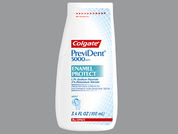Prevident 5000 Enamel Protect
Sodium Fluoride/Potassium Nit
What is Prevident 5000 Enamel Protect used for?
This medication is used to prevent cavities and to reduce pain from sensitive teeth (dentinal hypersensitivity). Sodium fluoride works by making the teeth stronger and more resistant to decay caused by acid and bacteria. Potassium nitrate works by calming the nerves in the teeth. Do not use this medication in children younger than 6 years old unless directed by your doctor/dentist. Some products are not recommended for use in children younger than 12 years. Ask your doctor or dentist for more details about using this product safely in children. Caregivers/parents should watch the child to make sure the child does not swallow the medication while brushing.
CHEMICAL NAME
DRUG TYPE
Throat/Mouth ConditionsPrevident 5000 Enamel Protect Prices
Searching for the lowest prices
What does Prevident 5000 Enamel Protect look like?
View all Prevident 5000 Enamel Protect Image Information (1)Prevident 5000 Enamel Protect Frequently Asked Questions
Use this medication as directed by your doctor/dentist, usually twice daily (in the morning and evening).
Use this medication in place of your regular toothpaste unless otherwise directed by your doctor/dentist. Apply at least a 1 inch (2.5 centimeters) strip of the medication to a soft-bristled toothbrush, and brush your teeth for at least 1 minute. Spit out the medication after use. Some products recommend rinsing your mouth thoroughly after use. If you are using the gel form of the toothpaste, children should rinse their mouth thoroughly right away after brushing. For adults, do not rinse your mouth, eat, or drink for at least 30 minutes after use to get the best results.
Do not swallow the medication. Make sure to brush all sensitive areas of the teeth.
Use this medication regularly in order to get the most benefit from it. To help you remember, use it at the same times each day.
Do not use this medication for longer than 4 weeks unless directed by your doctor/dentist. Sensitive/painful teeth may sometimes be a symptom of a serious problem that needs attention from a dentist.
Tell your doctor/dentist if your symptoms last or get worse.
IMPORTANT: HOW TO USE THIS INFORMATION: This is a summary and does NOT have all possible information about this product. This information does not assure that this product is safe, effective, or appropriate for you. This information is not individual medical advice and does not substitute for the advice of your health care professional. Always ask your health care professional for complete information about this product and your specific health needs.
